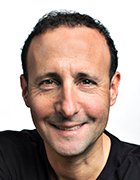
ktsdesign - stock.adobe.com
Ceridian eyes voice and predictive technology for HR
David Ossip, chairman and CEO of Ceridian, talks about future technology for HR, including voice and predictive analytics. The good news? More work done with fewer clicks.
Fresh from an IPO in April 2018, human capital management platform maker Ceridian is now a "revitalized organization" with a restructured balance sheet focused on new investments, according to Chairman and CEO David Ossip. Since Ceridian acquired Dayforce in 2012, the company has grown more than 60% and today has more than 3,300 customers using its SaaS-based platform. To look at it another way, as of January, customers have used mobile devices over half a billion times to access the Ceridian tools.
Ossip spoke about how new breakthroughs -- including in voice, predictive technology and machine learning (ML) -- could potentially impact HR in the very near future.
What new technologies will show up in Ceridian products?
 David Ossip
David Ossip
David Ossip: We've got a lot of voice tech that we're modeling, which effectively plugs in to all the various parts of voice engines, whether it be Alexa or Google or Cortana or Siri. We've trained the app, if you like, on all the various types of engines. So, if you say something like, 'I want to trade my ship," the voice engine might correct it to, 'I want to trade my shift.' Then, we'd have kind of an ML there. So, if you said something like that, it will come back and say, 'Would you like to know who is most likely to accept the shift?'
How soon are we going to see voice technology appear for your customer base?
Ossip: You should hear [about it] by the end of year. And there are a number of user stories you can focus on -- for example, a payroll administrator. I could wake up and have a Google Home device next to my bed, and I could say, 'Hey, Google, connect me to Dayforce. Am I ready to commit pay?' And it will come back and say, 'Location A and B haven't yet approved; they're trying to record.' And it'll then kind of respond back to you, 'Would you like me to send a reminder to the manager?' And if so, it initiates the workflow for you. And then you can get in your car, and say you have Alexa in your car, we built it so that the system works across the voice engines. So, you can then continue the conversation on your Alexa app or if you have Siri on your Apple Watch. You can continue and come back, and it will say, 'You are now ready to commit pay. Would you like me to validate payroll for you?' And you really come to the area where the application's helping. If you forget [something], it understands what you're trying to do and initiates the necessary workflows to do it. And that will save a lot of time for a lot of people.
Is this something customers were asking for, or did the predictive technology and voice efforts come from you?
Ossip: It was initiated by us. One thing that has changed in terms of enterprise apps is that the user experience, the shelf life of a user experience, is much shorter than it ever has been in the past. And advances in voice technology don't happen linearly. If you look at the advancement in the last month, it's more than the advancement in the month before, so it's just improving so quickly. If you think back to when you first got Siri on your Apple phone, when you used to try to speak to it, it was basically impossible. Whereas now, you can speak quickly without pause, you can have background noise and your voice engines … understand you very nicely. And so, with the key improvement in the underlying voice tech, we sought to look for a way we could extend our user experience. It's [not] very different than what you would do for a consumer app. If you look at the new gaming apps or if you look at a lot of the other consumer apps out there, they are beginning to blend.
Is consumerization coming to enterprise apps then?
Ossip: Yes. In 2009 [when Dayforce was acquired by Ceridian and Ossip was named CEO], when I looked at the industry, I knew there were a lot of other advancements like data and complicated technology that were coming upstream. And it was the employees, whether they were a worker or a manager, saying, 'I have a different set of expectations now as to what I want my improved app to do and how I want it to behave and how I want to interact with it.'
Are there other areas where we should expect to see changes in app functionality thanks to predictive technology for HR?
Ossip: We use predictive tech for other things. We have a machine learning main algorithm [in Ceridian's TeamRelate employee engagement tool] that looks at the aggregation of our client's data, and it tries to determine when someone might be at risk of leaving an organization. And then we can format an alert to a manager. What TeamRelate does is that it understands the whole conventions and the communications of the individual, and we use that information to coach the manager on how to communicate better with people. So, for example, if someone is at risk of leaving the organization, we use that tech to coach the manager to have the conversation with the person so that [the manager] learns to accentuate the reasons a person shouldn't leave the organization.
We also use it more broadly for customer experience, like in the payroll industry, for example. At a certain time, based on the frequency of the pay group and what we know, we continually look at the application to see when people are using the app, and if we don't see the usage of the application indicative of the payroll administrator committing pay, on the day that they commit pay in the time window that they generally commit pay that they've got in their history, we're now able to proactively reach out to the client and say, 'It looks like you're struggling a bit today. Can we help you?' Now, we're using a predictive technology to reach out to customers before they run into a problem.
If you see someone driving on the wrong side of the road, swerving side to side, they're probably going to run into a problem. If you use [predictive technology] to determine if the client is swerving down the road, you can call them and get them back on track.
How do you think technology for HR will continue to evolve over the next few years?
Ossip: I think the [technology] experience will always be a combination of web, mobile and voice. What I think will change is, instead of having to do as many clicks as we have to today, I believe the systems will use predictive technology effectively to do a lot of things for you automatically. For example, if you were to try and request a day off, you would just basically be able to initiate it, and it would suggest the dates for you. It would automatically notify your manager, and it would just look at your manager's prior behavior and give you better suggested dates that are more likely to be accepted. If you were, as I mentioned before, a payroll administrator, you'd be able to just say to the system, 'I would like to process payroll today.' And it would check all of the locations that still had outstanding edits or were hunting down the necessary approval. It would contact them for you, it will initiate the workflow, it will respond to the various workflows and it would only reach out to you to handle various types of exceptions. And even on the exception basis, eventually, the system would manage most of those exceptions for you.
Doesn't this mean our workforce will change -- that we'll be hiring different kinds of people?
Ossip: Well, it changes, right? Instead of the payroll person running payroll, they could spend more time looking at compensation, or they could spend more time analyzing the actual data. So, I think, it changes as to what people do. But, yes, I do believe that predictive tech [will change things]. The basic premise is that the cost of predictive technology is dropping very, very rapidly. And as that cost declines, you'll see more and more applications making use of the predictive technology to do a lot of things that you never thought were possible.







